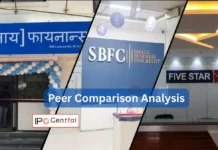What is NSCCL Full Form and History?
The NSCCL meaning refers to the National Securities Clearing Corporation Limited. It handles trade clearing and settlement in India. It was established in August 1995 as a wholly-owned subsidiary of the National Stock Exchange (NSE) of India. It holds the distinction of being the first clearing corporation in India and was a pioneer in implementing a settlement guarantee for trades, which enhances investor confidence and market stability
Table of Contents

Since then, NSCCL has been renamed NSE Clearing Limited. Recognized by the Security and Exchange Board of India (SEBI) as a Qualified Central Counterparty (QCCP) and a systemically important market infrastructure institution, NSE Clearing boasts the highest corporate credit rating of ‘AAA’ by CRISIL since 2008, signifying its exceptional strength in terms of debt repayment.
Read Also: Best IPOs that Doubled Investors’ Money
What are the Objectives of NSCCL?
NSE Clearing aims to provide safe and efficient value-added services while setting global benchmarks through strong risk management systems and processes. The primary objectives of NSE Clearing are outlined below:
- to bring and sustain confidence in the clearing and settlement of securities
- to promote and maintain, short and consistent settlement cycles
- to provide a counter-party risk guarantee
- to operate a tight risk containment system
Eligibility Criteria for NSCCL Membership
Membership in the National Securities Clearing Corporation Limited is open to various entities, each with specific eligibility criteria. Below are the key categories and requirements for membership:
- Corporate Entities:
- Must be a registered company under the Companies Act.
- Should meet the net worth and deposit requirements as specified by National Securities Clearing Corporation.
- Limited Liability Partnerships (LLPs):
- Must be registered under the LLP Act.
- Required to fulfill net worth and deposit criteria.
- Partnership Firms:
- Must be a registered partnership.
- Compliance with net worth and deposit requirements is necessary.
- Sole Proprietorships:
- Individuals operating as sole proprietors can apply.
- Must meet the financial criteria set by the National Securities Clearing Corporation.
- Banks and Financial Institutions:
- Eligible to apply if they comply with NSCCL’s specific financial requirements.
- Trusts:
- Trusts can also seek membership, provided they meet the eligibility criteria outlined by NSCCL.
General Requirements
- Applicants must submit a written application on official letterhead.
- Compliance with any additional documentation or financial disclosures as required by NSE Clearing.
- Entities must maintain a minimum net worth as specified in the eligibility guidelines.

What is the Settlement Process Through NSE Clearing?
The settlement process through NSE Clearing can be outlined as follows:
1- At the beginning of the settlement cycle, NSE Clearing receives all the trades executed or locked in on the trading day.
2- Based on the details of all trades received, NSE Clearing calculates the cumulative obligation of each member for trade settlement.
3- The calculated settlement information is electronically transmitted to the Clearing Members (CMs). All trades completed during a specific trading period are grouped for settlement.
4- NSE Clearing employs a multilateral netting procedure to determine the net settlement obligation of each Clearing Member, irrespective of whether they are a delivery or receiver in the transaction.
5- Following the netting process, the settlement procedure involves allocating the delivery of securities to ensure precise delivery and receipt obligations of funds and securities for each NSCCL member.
6- Once the payout of funds and securities is declared and released, the settlement process is completed.
7- On the pay-in day, delivering members are required to bring in the specified securities, which are then delivered to the respective receiving members on the pay-out day.
Read Also: State-wise IPO in India
What are NSCCL’s Products?
NSE Clearing offers a diverse range of products for settlement. Apart from settling stocks listed on the NSE, it acts as a centralized platform for settling various other products. The products catered by NSCCL include:
- Equities
- Security Lending and Borrowing Scheme (SLBS)
- Equity Derivatives
- Currency Derivatives
- Commodity Derivatives
- NSE Bond Futures
- Debt Segment
- Corporate Bonds
Read Also: RSU Vs ESOP – Which one is better?
Who are the Partners of NSCCL?
NSE Clearing collaborates with various participants and partners to facilitate the settlement of trade transactions. The key partners of NSE Clearing Limited are:
1 – Clearing banks
Clearing Banks serves as a central point of contact for all Clearing Members, providing services such as branches across cities, advanced electronic fund transfer portals, working capital facilities, deal settlements, and banking facilities like issuing bank guarantees/credit facilities.
There are a total of 14 banks that facilitate clearing services
- Axis Bank Ltd.
- Bank of India Ltd.
- Canara Bank Ltd.
- Citibank
- The Hong Kong & Shanghai Banking Corporation Ltd.
- ICICI Bank Ltd.
- HDFC Bank Ltd.
- IDBI Bank Ltd.
- IndusInd Bank Ltd.
- JPMorgan Chase Bank
- Kotak Mahindra Bank Ltd.
- Standard Chartered Bank
- Union Bank of India
- State Bank of India
2 – Custodians
Custodians settle trades on behalf of their clients by confirming their settlement and assuming the obligation assigned by the clearing house. If the settlement is not confirmed, the trading member bears the settlement obligation levied by the clearing house.
3 – Depository
Depositories are responsible for promoting the dematerialization of listed shares on the stock exchanges. NSE Clearing is associated with both depositories in India, namely NSDL (National Securities Depository Limited) promoted by NSE, and CDSL (Central Securities Depository Limited) promoted by BSE Ltd.
The dematerialized settlement has been made mandatory by SEBI, increasing the proportion of shares delivered in dematerialized form, with 99% of all securities settlements in India being conducted in dematerialized form.
Read Also: NSE Unlisted Share Price
NCL – Financial Performance
The working of NCL during the year has resulted in a net profit after tax of INR 1,625.65
crores on a standalone basis and INR 1,620.05 crores on a consolidated basis.
| FY 2023 | FY 2024 | 9M FY 2025 | |
| Income | 1,015.53 | 2,188.91 | 2,777.05 |
| Expenses | 299.92 | 410.38 | 555.58 |
| Profit before tax | 715.61 | 1,755.65 | 2,194.34 |
| Profit after tax | 529.51 | 1,305.91 | 1,620.50 |
| Margin (%) | 52.14 | 59.66 | 58.35 |
Read Also: All-time largest IPOs in India at a glance

Conclusion
NSE Clearing, is India’s largest clearing corporation, ensuring smooth clearing of trades from various segments under the NSE. With a focus on risk management and robust settlement procedures, the National Securities Clearing Corporation has been the backbone of billions of trade transactions in India. It continues to fuel seamless and structured trade settlement in the Indian securities market.
Happy Investing! For more insightful articles, explore our collection on IPOs, stock market holidays, and various investment options. Let us know your thoughts in the comments below.
Interested in NSE? More Articles For You
- NSE IPO News
- NSE IPO Update
- NSE Emerge Platform: All You Need to Know
- NSE IPO Timeline: 1 IPO, 5 SEBI Chiefs, 10 Years
- NSE Unlisted Share Price
- Is NSE Undervalued or BSE Overvalued? NSE IPO May Be the Reset Trigger!
- ASBA e Forms – Download IPO Application Form, BSE & NSE IPO Forms 2026
- Difference Between NSE and BSE – Accurate Comparison
- NSE IFSC: Important Points About Investing in US Stocks
- How Many Companies are Listed in NSE and What are NSE Series?
- NSCCL: 7 Most Important Points about NSE Clearing
- Stock Market Holidays 2026 – BSE, NSE trading holidays






































